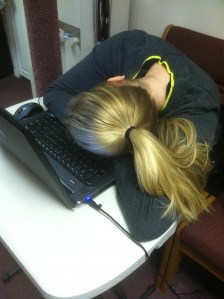Energy Boost?
 Do you often find yourself reaching for an energy drink to get you through the day? It is a fairly late hour and only now do you have the time to finally sit and attempt to meet a deadline. Before you can begin your task, your attention quickly turns to wondering what is available to give you a speedy energy and brain boost. Coffee used to be the method of choice. However, in the last decade, coffee has more frequently been replaced with energy drinks, since their effects are obtained more quickly.
Do you often find yourself reaching for an energy drink to get you through the day? It is a fairly late hour and only now do you have the time to finally sit and attempt to meet a deadline. Before you can begin your task, your attention quickly turns to wondering what is available to give you a speedy energy and brain boost. Coffee used to be the method of choice. However, in the last decade, coffee has more frequently been replaced with energy drinks, since their effects are obtained more quickly.
The allure of energy drinks most likely is they provide the desired results in a quick and nearly effortless way, more so than tea or coffee due to the amount of liquid sometimes necessary to consume to achieve alertness. However, recent research conducted at the University of Southern California shows that as energy drink sales increased over the years, so has the number of emergency room visits from energy drink side effects. The study shows side effects ranging from heart palpitations, chest pains, seizures and even deaths. Perhaps as no coincidence of these statistics, the FDA just launched an investigation into how much caffeine is added to food and beverages.
The fact of the matter is that consumers are not fully informed about how much caffeine energy drinks actually contain. This is either because energy drink manufacturers are not required to list the exact amount of added caffeine, or they are disguising it in the ingredients as coffee, tea or natural caffeine containing products such as guarana. Some drinks contain 50 milligrams of caffeine, while others can contain as much as 215 mg of caffeine in an eight-ounce serving (with most of the cans/bottles containing more than 8 ounces). Most experts advise consuming no more than 400 mg of caffeine per day.
Despite the sheer amount of caffeine being an issue, the other problems are the speeds at which the caffeine is delivered in the body, and the way energy drinks are used as mixers with alcohol. The risk of a complication becomes greater when even an amount of caffeine within recommendation (400mg or less) is taken in one gulp. Even more serious is combining an “upper” like caffeine with a depressant like alcohol.
In an effort to avoid complications that can come from consuming energy drinks, here are some tips on how to obtain an energy boost from natural, healthy options.
- There is always the old standby: a good old-fashioned “cup of joe.” Drinking coffee in moderation is a fine way to give you that boost. However, try and consume your last cup before 2:00pm if you want to avoid having trouble falling asleep at night.
- Water: keeping hydrated by drinking water can actually combat fatigue.
- Consume water-rich fruits and vegetables such as cucumbers, watermelon, lettuce, and broccoli.
- Make sure your food choices are providing you with the right amounts of vitamins daily. If you think you may be falling short of certain nutrients this could lead to fatigue. Take a multivitamin to supplement the foods you eat to be sure you are meeting your requirements.
- Most importantly and probably most helpful is to work towards getting a good night’s sleep every night. You need about 7-9 hours, so make it your goal to try and give your body more shut-eye!
Try at least one of the healthier recommendations this week instead of reaching for an energy drink.
Your turn to take action: What will you reach for the next time you need an energy boost?

Leave a Reply
Want to join the discussion?Feel free to contribute!